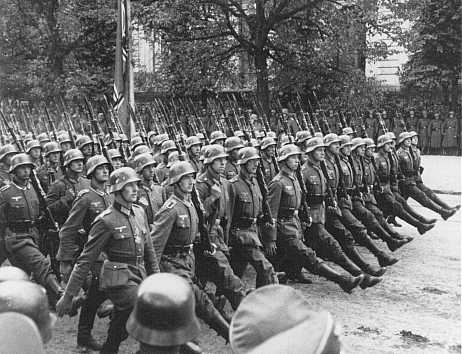Sunday 1 October 1939
 |
| Britain's King George VI, right, and Queen Elizabeth leave St.Paul's Cathedral, London, on Oct. 1, 1939, following a service for the Nation's Day of Prayer. |
The Polish garrison on the Hela Peninsula (Admiral Józef Unrug) decides to surrender.
Following the Battle of Szack, the Polish Defence Corps (Gen. Wilhelm Orlik-Rückemann) is on the run and has crossed the Bug River. The Poles have walked hundreds of kilometers in the past fortnight, are marching through the night and are short of supplies, but they remain a disciplined fighting force. Near the village of Wytyczno near Włodawa, tank elements of the Soviet 45th Rifle Division attack at 1 a.m. The Poles fight them off and destroy four Soviet tanks. Another assault in daylight by the majority of the Soviet division again is beaten off, but the Poles are running out of ammunition. The exhausted Polish units then form small groups and melt away through the forests to join other units. The Battle of Wytyczno is considered a Soviet tactical victory, but also a Polish moral victory by only a few thousand poorly armed men against overwhelming odds.
British Military Intelligence: Poles fleeing from their country to England bring with them two Enigma machines.
Battle of the Atlantic: The Admiralty learns of the pocket battleships Graf Spee and Deutschland operating as lone commerce raiders.
U-35 sinks 2,239-ton Belgian merchant ship Suzon 42 miles off Ushant at 18:45 after stopping it, inspecting it, and disembarking the crew. The kill is legal because the ship, even though neutral, is transporting war goods from Bordeaux to Cardiff.
Western Front: The French claim a small advance near the district town of Saarlouis in the Saar.
British Homefront: Winston Churchill makes his first wartime broadcast to the British people. He summarizes the events of the first month of the war. He suggests that the Soviet invasion of Poland "was clearly necessary for the safety of Russia against the [German] menace." He coins the famous phrase "a riddle wrapped in a mystery inside an enigma" to describe Soviet machinations, "a cold policy of self-interest."
Churchill lists "three important things" that happened in that month:
- Poland has been overrun;
- The assertion of the power of Russia;
- "The U-boat attack has not so far proved successful"
A Royal Proclamation is issued calling up the classes of 1918 and 1919.
China: The Japanese 11th Corps. withdraws from Changsha and the nearby Tungting Lakes. Chiang Kai-shek has a rare victory in this "Battle of Changsha."
Soviet/Japanese Relations: As a show of good faith to the Soviets, the Japanese dismiss senior officers of the Kwantung army who had led the battle of Khalkin Gol. The dismissed Generals had been contemptuous of Tokyo authority.
German/Italian Relations: Italian Foreign Minister Count Ciano is in Germany for discussions with Hitler and Ribbentrop.
Soviet/Turkish Relations: The Turkish Foreign Minister (M. Sarajoglu) meets with Molotov in Moscow.
German Homefront: On an undetermined day in October, Hitler has typed on his personal stationery (and backdated to 1 September 1939) a Fuhrer Decree that authorizes mercy killings of persons who "are incurable."
September 1939
September 1, 1939: Invasion of PolandSeptember 2, 1939: Danzig Annexed
September 3, 1939: France, Great Britain Declare War
September 4, 1939: First RAF Raid
September 5, 1939: The US Stays Out
September 6, 1939: Battle of Barking Creek
September 7, 1939: Polish HQ Bugs Out
September 8, 1939: War Crimes in Poland
September 9, 1939: The Empire Strikes Back
September 10, 1939: The Germans Break Out
September 11, 1939: Battle of Kałuszyn
September 12, 1939: The French Chicken Out
September 13, 1939: The Battle of Modlin
September 14, 1939: Germany Captures Gdynia
September 15, 1939: Warsaw Surrounded
September 16, 1939: Battle of Jaworów
September 17, 1939: Soviets Invade Poland
September 18, 1939: Lublin Falls
September 19, 1939: Germans, Soviets Hook Up
September 20, 1939: the Kraków Army Surrenders
September 21, 1939: Romania Convulses
September 22, 1939: Joint Soviet-German Military Parade
September 23, 1939: The Panama Conference
September 24, 1939: The Luftwaffe Bombs Warsaw
September 25, 1939: Black Monday for Warsaw
September 26, 1939: Warsaw on the Ropes
September 27, 1939: Hitler Decides to Invade France
September 28, 1939: Warsaw Capitulates
September 29, 1939: Modlin Fortress Falls
September 30, 1939: Graf Spee on the Loose
October 1939
October 1, 1939: Occupation of WarsawOctober 2, 1939: Hel Peninsula Falls
October 3, 1939: The Diamantis Incident
October 4, 1939: Otto Kretschmer Gets Rolling
October 5, 1939: Polish Resistance Ends
October 6, 1939: Hitler Peace Effort
October 7, 1939: The British Have Arrived
October 8, 1939: First RAF Kill from UK
October 9, 1939: "City of Flint" Incident
October 10, 1939: Lithuania Under Pressure
October 11, 1939: The Atomic Age Begins
October 12, 1939: England Rejects Hitler's Peace Offer
October 13, 1939: Charles Lindbergh Speaks Out
October 14 1939: Royal Oak Sunk
October 15, 1939: Cuban Rockets
October 16, 1939: First Aircraft Shot Down Over UK
October 17, 1939: Marshall Mannerheim Returns
October 18, 1939: Prien Receives His Award
October 19, 1939: Preliminary Plan for Fall Gelb
October 20, 1939: Hitler Grapples with the Jews
October 21, 1939: Hurricanes to the Rescue!
October 22, 1939: Goebbels Lies Through His Teeth
October 23, 1939: Norway the Center of Attention
October 24, 1939: German "Justice" Gets Rolling
October 25, 1939: Handley Page Halifax Bomber First Flies
October 26, 1939: Jozef Tiso Takes Slovakia
October 27, 1939: King Leopold Stands Firm
October 28, 1939 - First Luftwaffe Raid on Great Britain
October 29, 1939: Tinkering with Fall Gelb
October 30, 1939: Defective Torpedoes
October 31, 1939: Molotov Issues an Ultimatum
2019


